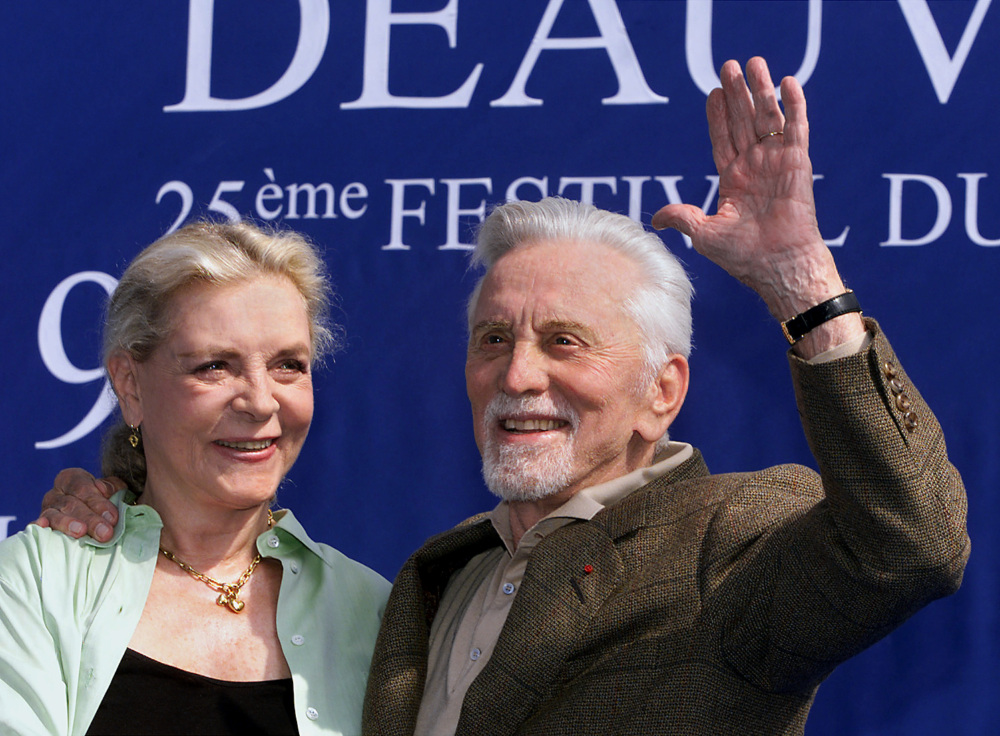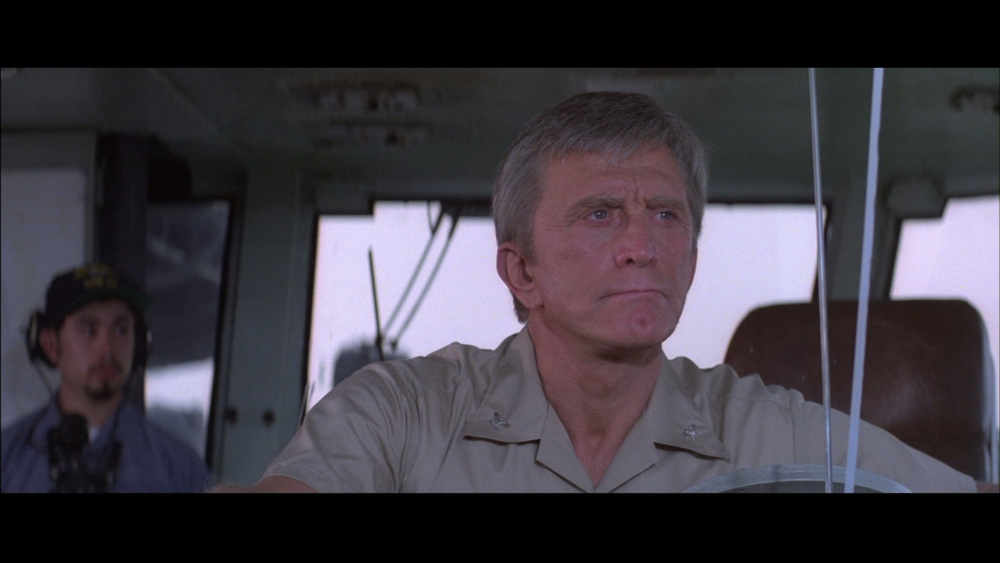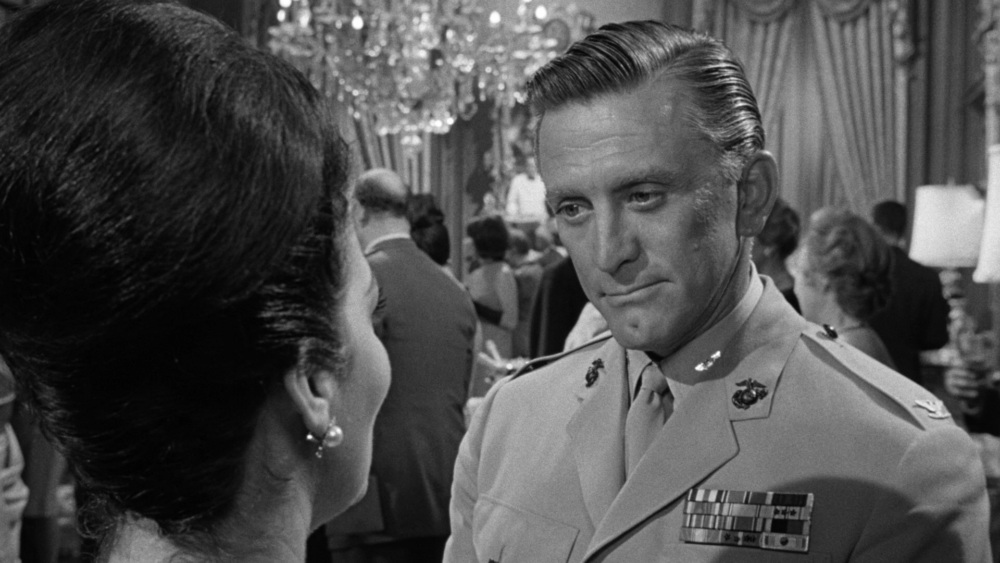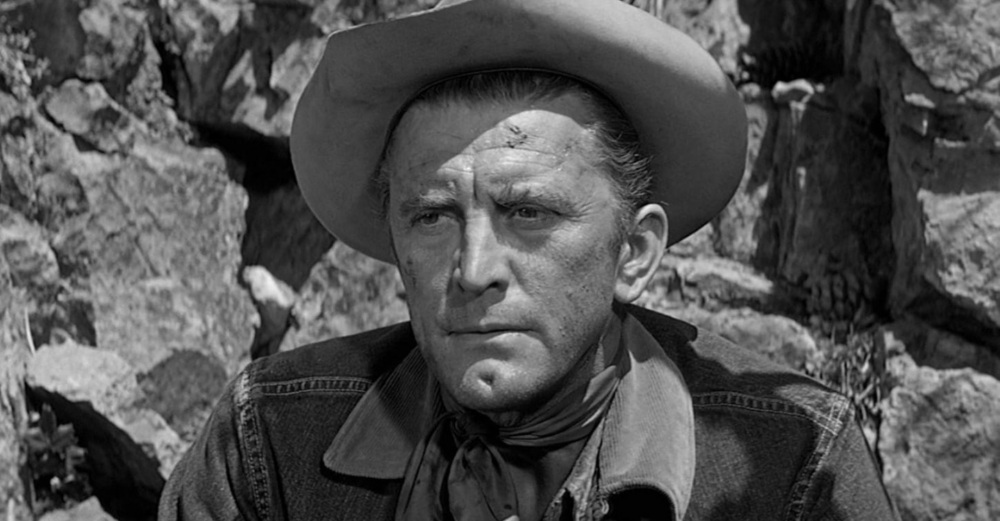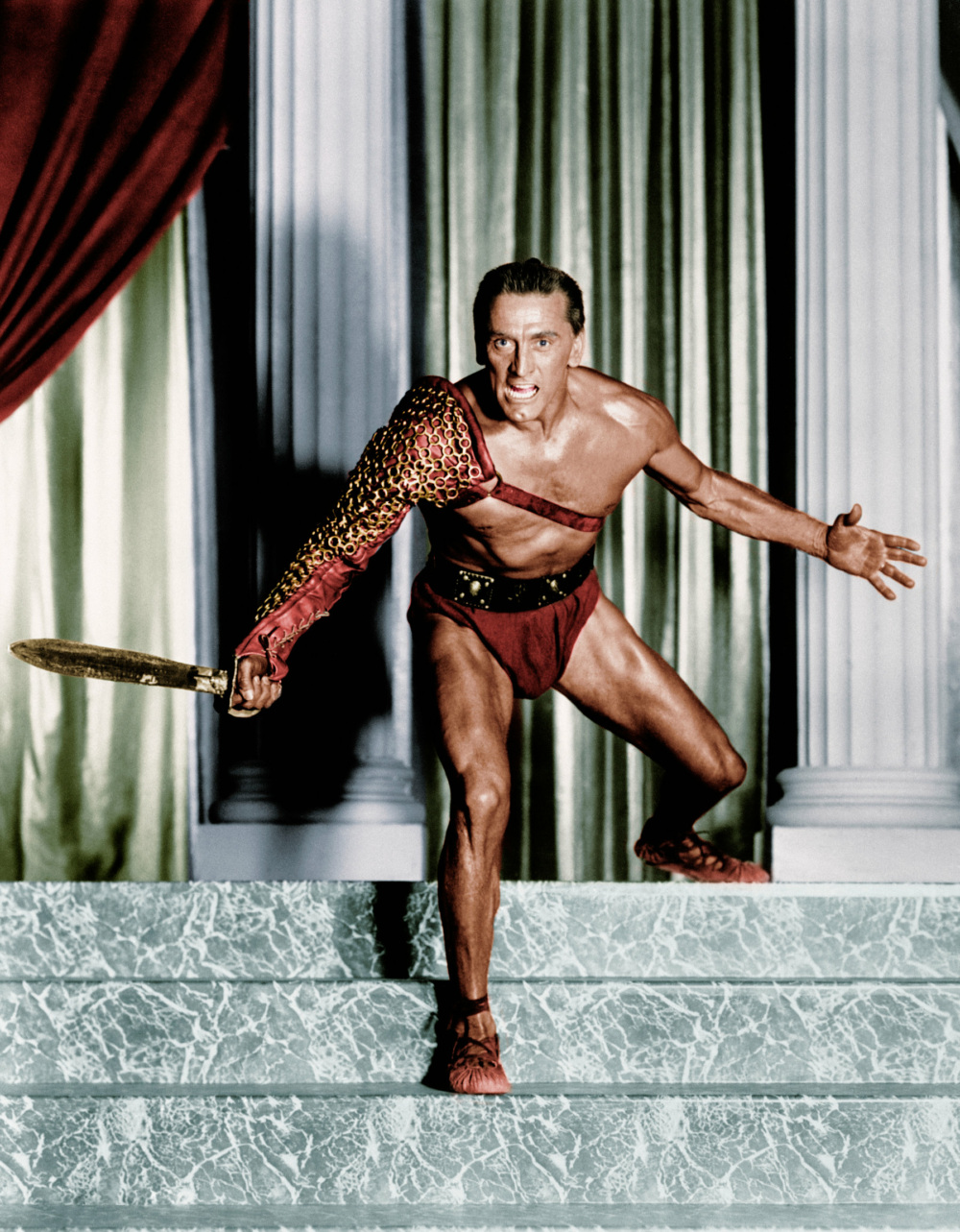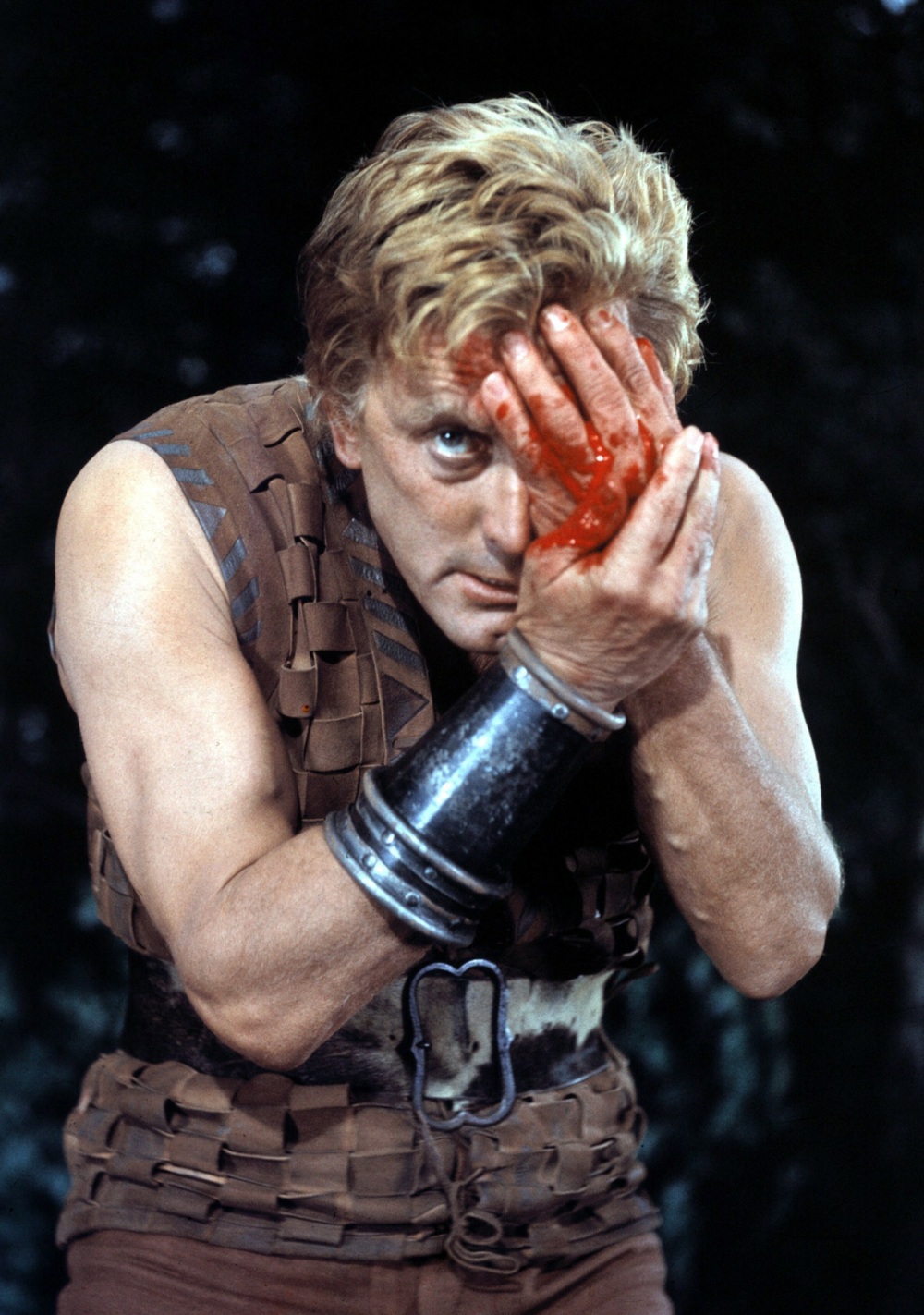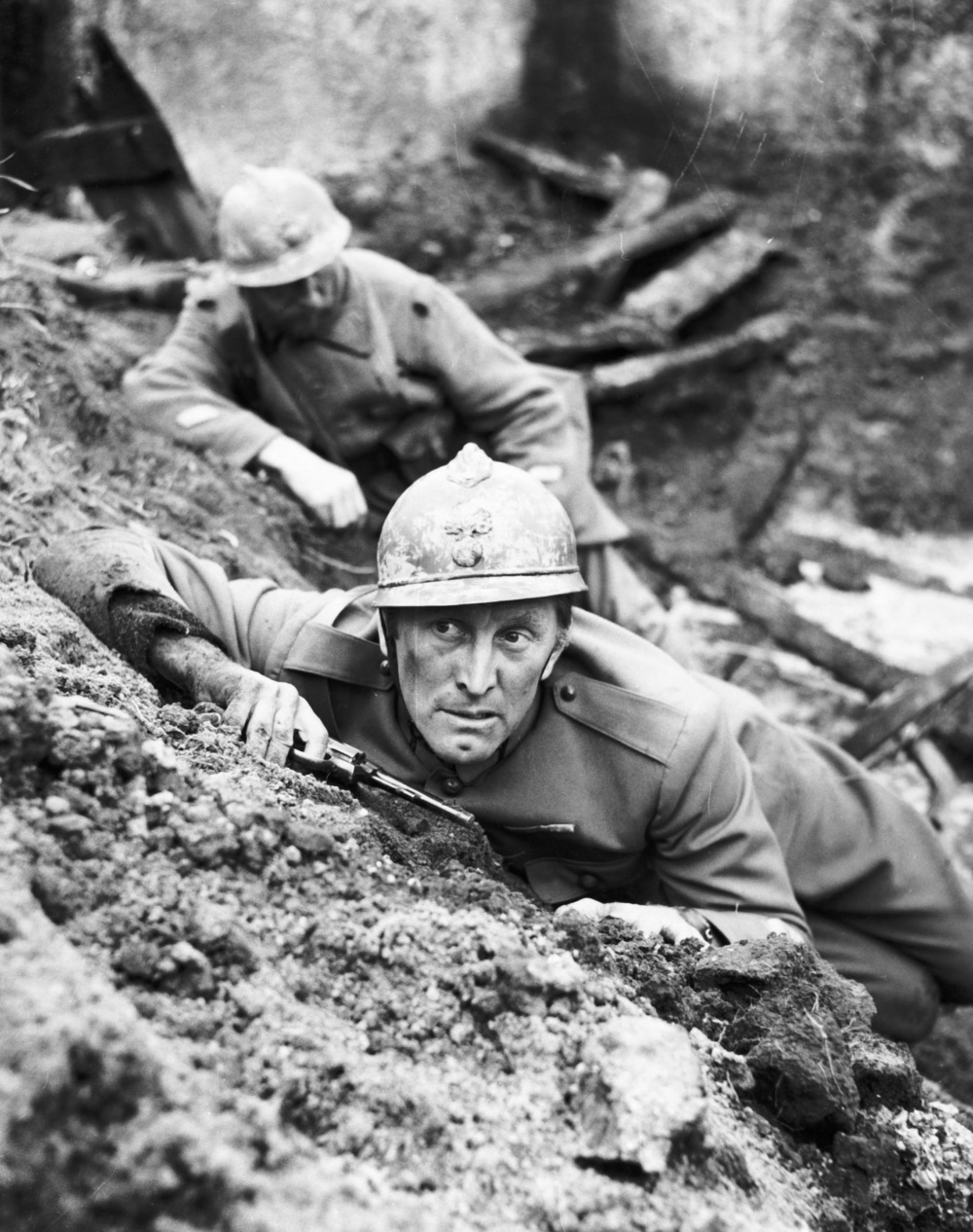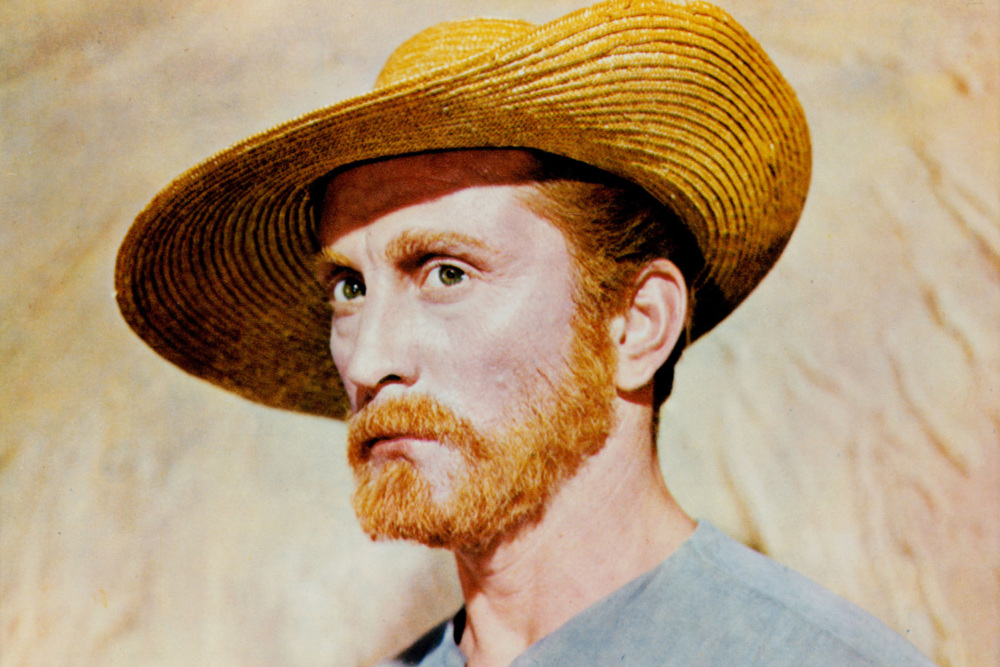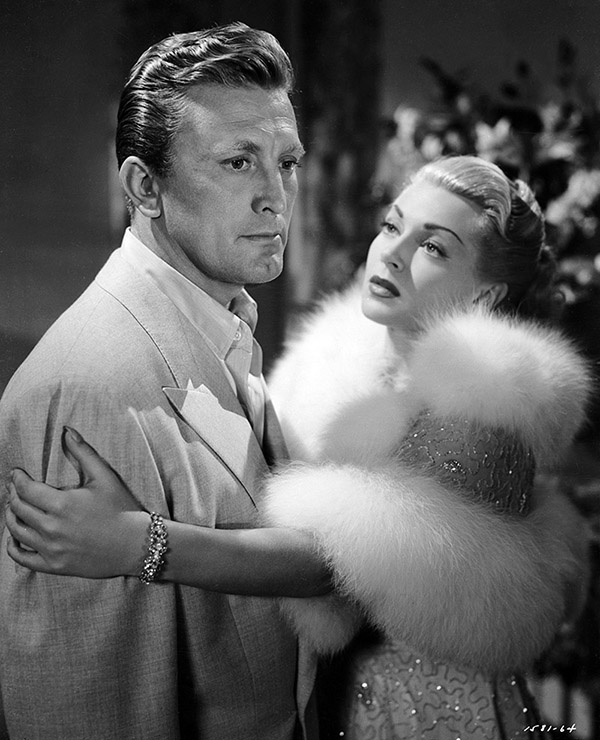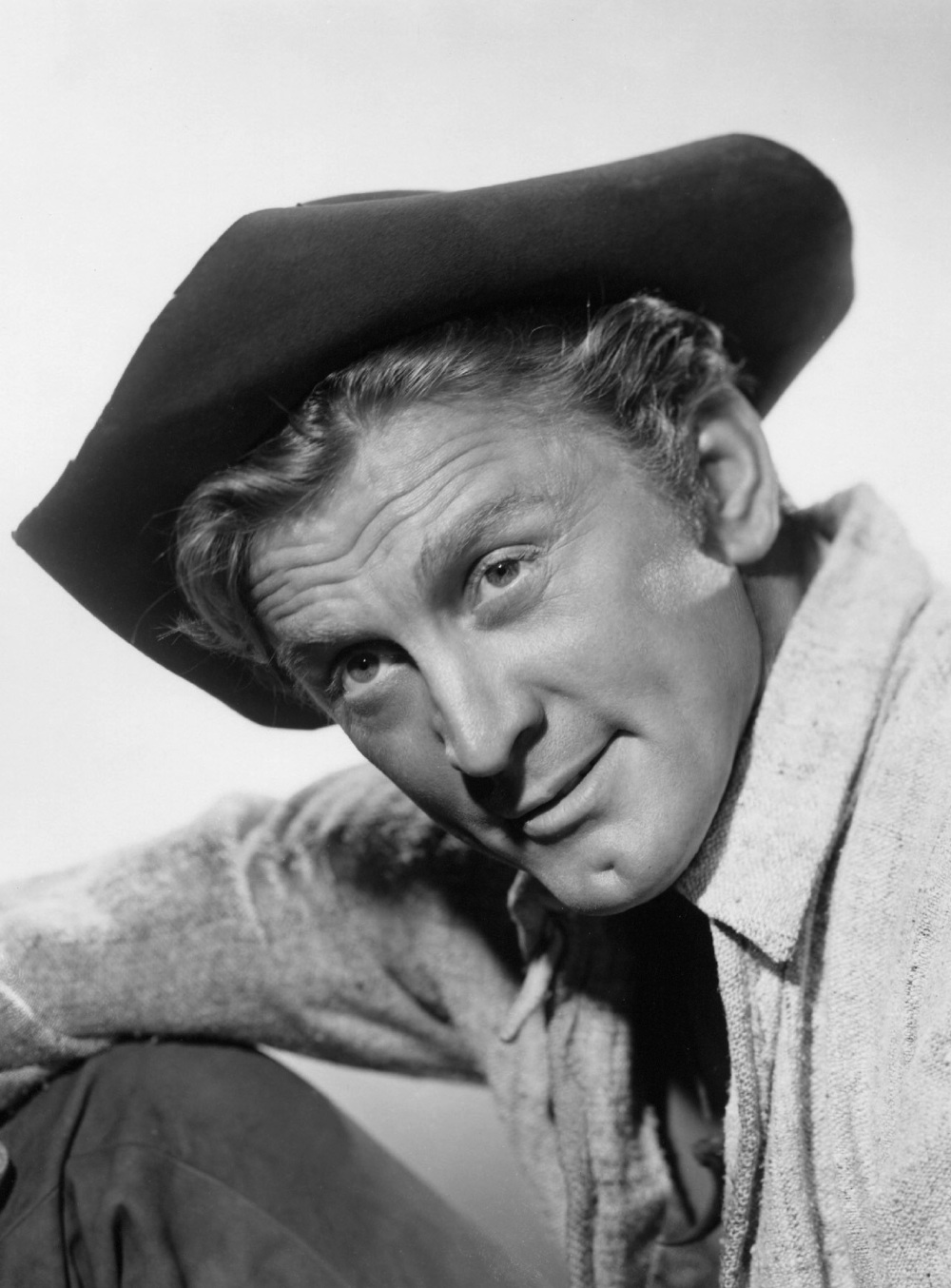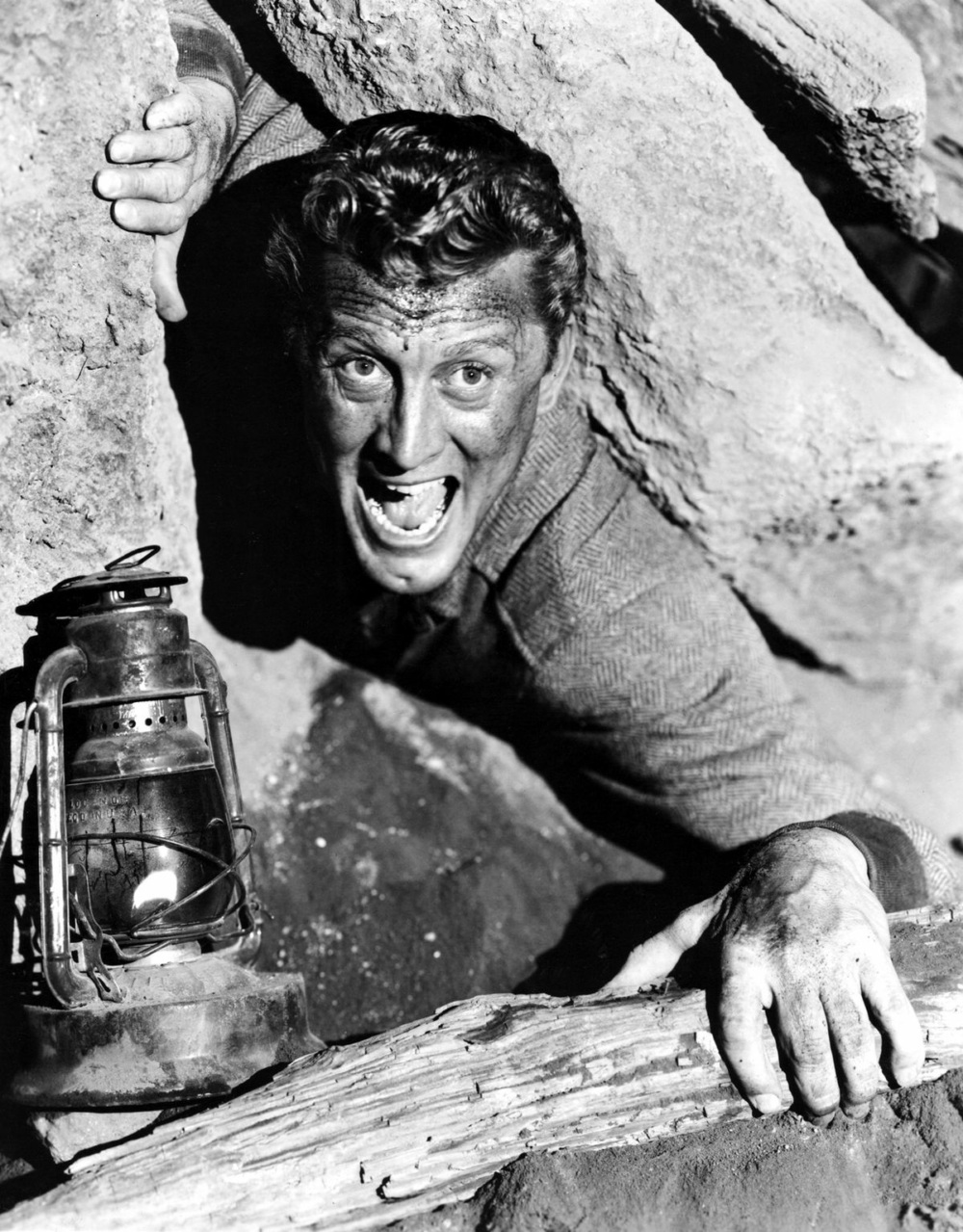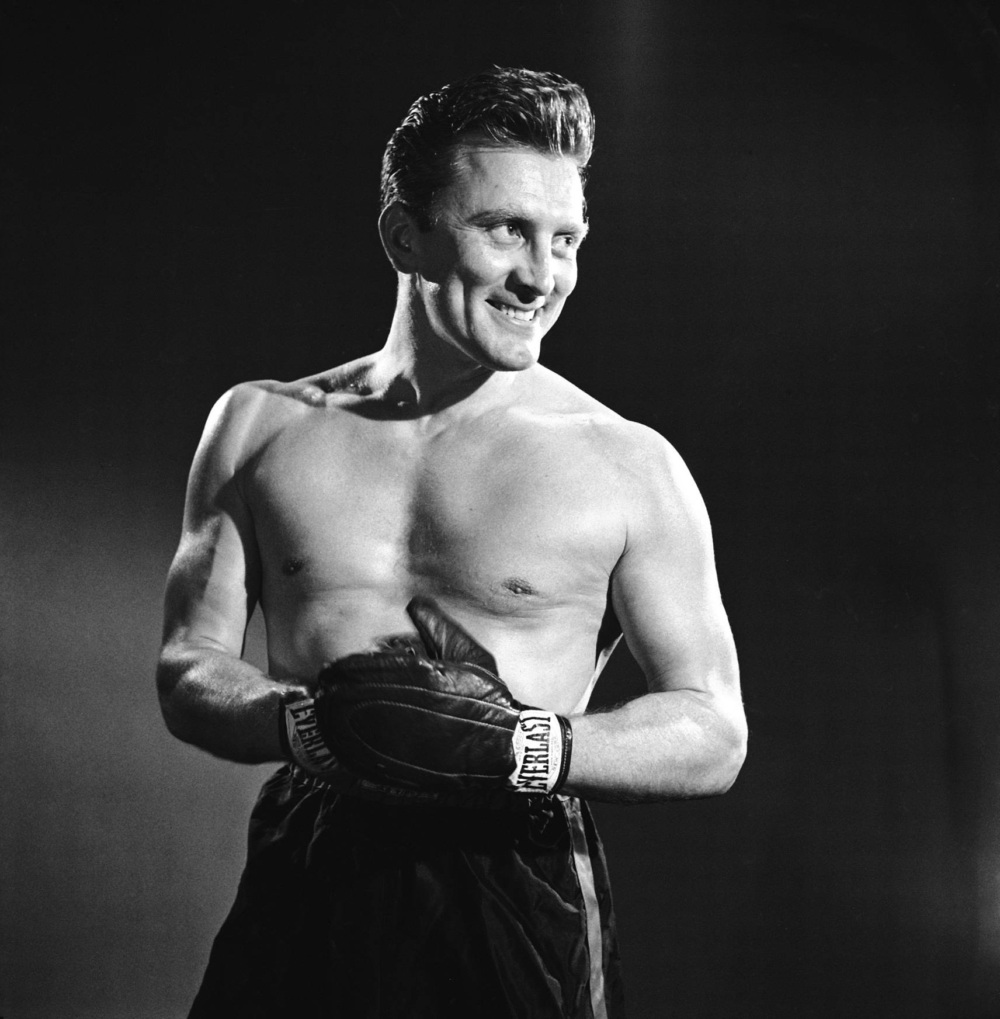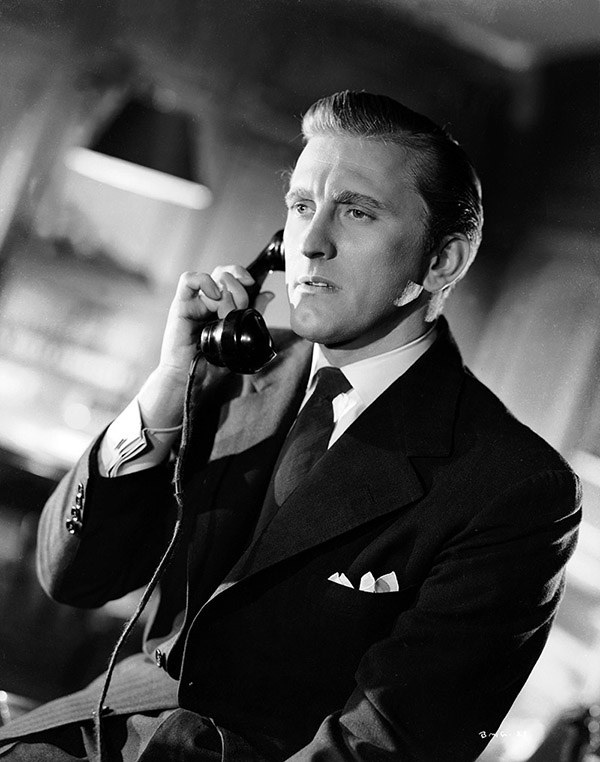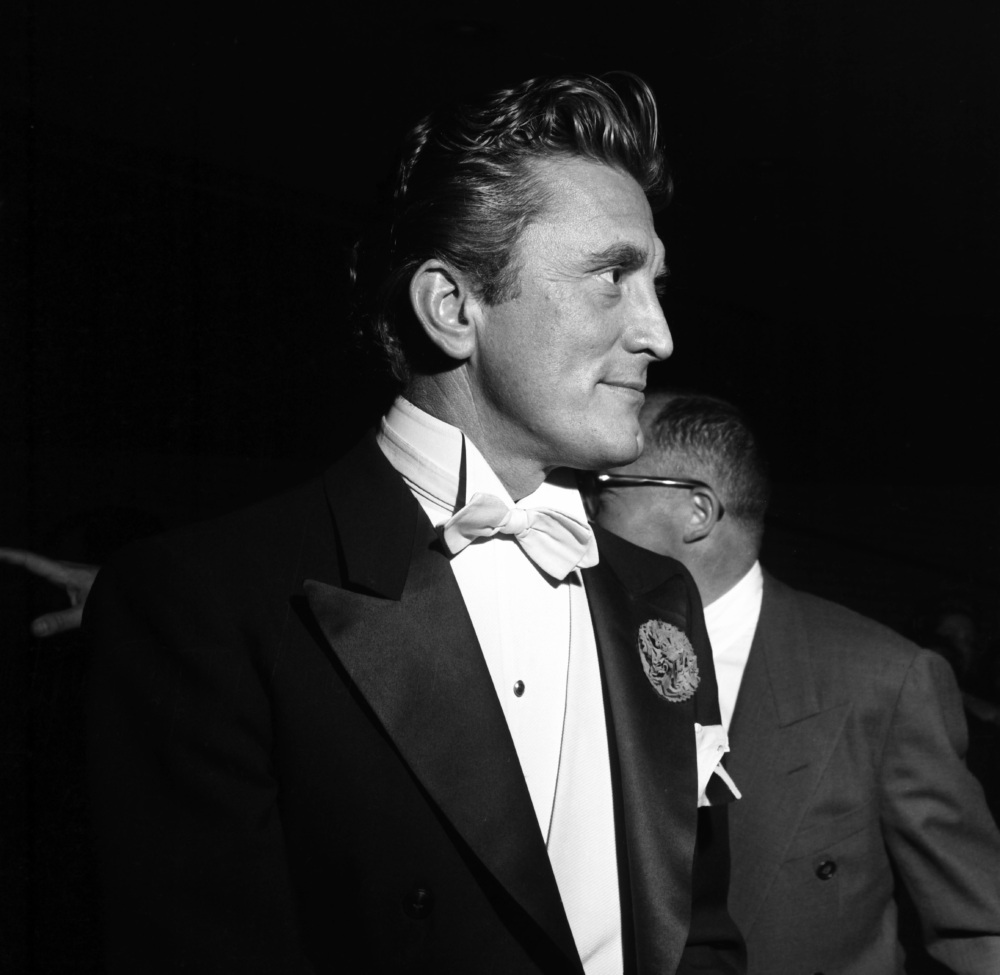
Tribute to Kirk Douglas
(1916−2020) Actor, director & producerEvent
“France is my second country. People here love me more than in the United States.”
A dimpled chin. A detail, but it is the one that comes to mind when one thinks of Kirk Douglas, who died this past February 5th, at the age of 103. Despite having been a major figure in American film, one of the last Old Hollywood stars and an architect of that system’s demise, a bold producer, a talented writer and above all, an actor of uncommon force and courage, it is that troubling cleft chin – “How do you shave that thing?” Kim Novak asked him in Richard Quine’s Strangers When We Meet (1960) – that stands out.
One might also see it as emblematic of the wounds and scars afflicting the characters Kirk Douglas played over the course of a career that spanned the entire latter half of the 20th century.
Shorn of a finger in Howard Hawks’ The Big Sky (1952) and an ear in Vincente Minnelli’s Lust for Life (1957), blinded in Richard Fleischer’s The Vikings (1958), crucified in Stanley Kubrick’s Spartacus (1960) and run over by a truck in Elia Kazan’s The Arrangement (1969), he shared none of John Wayne’s triumphant heroism, instead an ambivalent figure whose public image as a patriarch – the actor Michael Douglas is his son – was likewise shattered after the death by overdose of another son, Eric, in 2004.
In 1996, a stroke that severely impaired his speech wasn’t enough to keep Kirk Douglas definitively out of the spotlight. A regular guest of the world’s greatest film festivals, he also became a recurring presence on bookstore shelves. A memoirist and novelist, several of his books – including “The Ragman’s Son” (Renaissance Press, 1988), the first volume of his memoirs – enjoyed long stays atop bestseller lists. In recent years, he distinguished himself on the Web with a blog that showed an unexpected spontaneity for a nonagenarian.
Of Jewish descent, the Danielovitch family came from Belarus to settle in Amsterdam, on the Hudson River in upstate New York. Issur was born there on December 9th, 1916, only brother to the six daughters of Herschel, a ragman, and Bryna. He had an impoverished childhood and had to take on various small jobs to finance his education.
He found his calling as an actor in adolescence and enrolled in St. Lawrence University. Battling anti-Semitism at every stage of his career, he became a star on the wrestling team, and soon took drama classes in New York. Issur Danielovitch took on the pseudonym Kirk Douglas and was a peer of Betty Joan Perske, the future Lauren Bacall. When the U.S. went to war, the young man joined the Navy and was medically discharged for injuries in 1944.
A Hollywood star by now, Lauren Bacall recommended her friend to Warner producer Hal B. Wallis, and Kirk Douglas made his screen debut at age 30 in Lewis Milestone’s The Strange Love of Martha Ivers, in 1946.
Despite his powers of seduction, Kirk Douglas was cast in unsavory roles at first, such as the mobster seeking revenge on Robert Mitchum in Jacques Tourneur’s Out of the Past (1947), “son of a bitch roles”, as he later called them. But also imperfect males, like the husband in Joseph L. Mankiewicz’s A Letter to Three Wives (1949).
Kirk Douglas soon met Vincente Minnelli, his director of choice. In 1952, they made The Bad and the Beautiful together, a pitiless and extreme portrayal of the black magic of cinema, and the ways it both glorifies and corrupts. In 1956, they made Lust for Life, “the one role in which I nearly lost myself”, the actor later admitted. His violent performance wasn’t enough to earn him the 1957 Oscar for Best Actor, which went instead that year to Yul Brynner for The King and I (Walter Lang). Minnelli and Douglas reunited a third time for Two Weeks in Another Town, in 1962.
While not subscribing to the Actors Studio method imposed by Marlon Brando and James Dean on Hollywood, Douglas committed intensely to each role, to the point of putting himself in psychological and physical danger. He ended the shoot of of The Big Sky (1952), Howard Hawks’ bucolic Western, with pneumonia. And that is really him dancing on the oars of a moving longship in The Vikings.
This taste for risk also manifested in Douglas founding his own production company, Bryna, named after his mother. This independence allowed him to undertake films that departed from Hollywood “entertainments.” Even The Vikings, a major spectacle in which he performed opposite Tony Curtis, stood out for the efforts made by its screenwriters and designers to attain a semblance of historical truth. Kirk Douglas took on for himself the role of the barbarian, a man whose monstrous appetites precipitate his downfall.
Next, he hired the young Stanley Kubrick to direct Paths of Glory, an anti-war drama set in 1917, in which he played a French colonel charged with defending soldiers accused of desertion. In France, faced with threats by veterans’ organizations and pressure from the Quai d’Orsay, United Artists, the film’s distributor, gave up applying for a screening visa. Audiences in France would have to wait until the summer of 1975 to discover Paths of Glory. Back in 1957, Kirk Douglas, as shown in an interview with the television newscaster Mike Wallace, was a public figure called on to speak about the major issues of the day. He publicly denounced Communism and “anything that might jeopardize the American Way of Life”.
Three years later, he went into production on Spartacus, firing the director Anthony Mann and replacing him with Stanley Kubrick. Beyond its place in the history of McCarthyism in Hollywood, Spartacus was also marked by incessant strife during its production. One of the stars of its very British cast (the film also featured Laurence Olivier, Jean Simmons and Peter Ustinov), Charles Laughton, who detested the screenplay, threatened to sue Kirk Douglas, and Stanley Kubrick stopped speaking to his cinematographer, Russell Metty. The adventure ended with a quarrel between Kirk Douglas and the future director of Doctor Strangelove (1964), deemed by his producer and actor as “incredibly intelligent, but so cold”. Spartacus would also be the last major film for the production company Bryna.
The early 1960s were less prolific. He appeared in big spectacles such as René Clément’s Is Paris Burning? (1966) and in Westerns alongside John Wayne (Burt Kennedy’s The War Wagon, 1967) and Robert Mitchum (Andrew McLaglen’s The Way West, 1967). In 1970, Kirk Douglas teamed once again with top filmmakers. Joseph L. Mankiewicz’s There Was a Crooked Man… (1970) was the first Western from the author of “All About Eve”, pitting Kirk Douglas, in the role of a ruthless criminal, against Henry Fonda, who played a prison warden. It was also the year of Kazan’s The Arrangement.
The “On the Waterfront” author adapted his own novel to draw the portrait of an America adrift. Kirk Douglas brought his confidence and swagger to a high-level executive responsible for a successful advertising campaign, who sees his life unravel after succumbing to the charms of a younger woman (Faye Dunaway), an avatar of the new America sprung forth from the social movements of the 1960s. Once again, Douglas brought his commitment and intensity of expression – he isn’t and never was the subtlest actor – to this role, which plays like a career summary. Unhappy with Kazan’s ending, he went so far as to re-edit the film, but the director’s version was distributed.
The end of Kirk Douglas’ big-screen career spanned several decades. He crossed paths with Brian De Palma (The Fury, in 1978) and re-teamed with Burt Lancaster, with whom he had shared the screen four times in their early careers, for Jeff Kanew’s Tough Guys in 1986. In 2003, Fred Schepisi’s It Runs in the Family gave him an opportunity to share the screen with his son Michael and his grandson Cameron.
These films add nothing to his glory, which remained immense. First, because the success of his son Michael Douglas, who became famous for the television show The Streets of San Francisco (1972−1976) and then a star with Romancing the Stone (1984), Wall Street (1987) and Fatal Attraction (1987), reflected back on his father. Then, because Kirk Douglas became a successful author. He published “The Ragman’s Son” in 1988. A bestseller in the United States, it was translated around the world. In the book, Douglas recounts his penniless childhood, his loves, and his artistic and political battles.
In 1991, he escaped death in a helicopter accident, which provoked in him a return to the Jewish faith, an evolution that he would describe in his other books, “Climbing the Mountain” (L’Archipel, 1999) and “My Stroke of Luck” (Michel Lafon, 2002). The latter also recalls his efforts, largely successful, at recovering his speech in the aftermath of his stroke.
The Venice and Berlin Film Festivals honored him with tributes and he finally received an Oscar for career achievement in 1996. In 2007, alongside the publishing of a new book, “Let’s Face It”, he created a page on the social network MySpace, and then a blog.
Thomas Sotinel, film critic
with the kind authorization of Le Monde
All right reserved
Selected filmography
Actor
2008 Building William Karel – TV
2004 Illusion Michal A. Goorjian
2003 It Runs in the Family Fred Schepisi
2000 Touched by an Angel John Masius – TV
1999 Diamonds John Asher – Deauville 1999
1994 Take Me Home Again Tom McLoughlin – TV
Greedy Jonathan Lynn
1992 The Secret Karen Arthur – TV
1991 Veraz Xavier Castano
L’Embrouille est dans le sac Oscar John Landis
1988 Inherit the Wind David Greene – TV
1986 Tough Guys Jeff Kanew
1985 Amos Michael Tuchner – TV
1984 Draw! Steven Hilliard Stern – TV
1983 Eddie Macon’s Run Jeff Kanew
1982 Remembrance of Love Jack Smight – TV
The Man from Snowy River George Miller
1980 The Final Countdown Don Taylor
Saturn 3 Stanley Donen & John Barry
1979 Home Movies Brian De Palma
The Villain Hal Needham
1978 The Fury Brian De Palma
1977 Holocaust 2000 Alberto De Martino
1976 Victory at Entebbe Marvin J. Chomsky – TV
1975 Once Is Not Enough Guy Green
La Brigade du Texas Posse Kirk Douglas */**
1974 Mousey Daniel Petrie – TV
1973 Scalawag Kirk Douglas *
Dr. Jekyll and Mr. Hyde David Winters – TV
1972 The Master Touch – Un uomo da rispettare Michele Lupo
The Special London Bridge Special David Winters – TV
1971 Catch Me a Spy Dick Clement
A Gunfight Lamont Johnson
The Light at the Edge of the World Kevin Billington **
Summertree Anthony Newley **
1970 There Was a Crooked Man… Joseph L. Mankiewicz
1969 The Arrangement Elia Kazan
1968 The Brotherhood Martin Ritt **
The Legend of the Silent Night Daniel Mann – TV
Laugh-In Digby Wolfe – TV
A Lovely Way to Die David Lowell Rich
1967 The War Wagon Burt Kennedy
The Way West Andrew V. McLaglen
1966 Paris brûle-t-il ? René Clément
Cast a Giant Shadow Melville Shavelson
1965 The Heroes of Telemark Anthony Mann
In Harm’s Way Otto Preminger
1964 Seven Days in May John Frankenheimer
1963 For Love or Money Michael Gordon
The List of Adrian Messenger John Huston
The Hook George Seaton
1962 Two Weeks in Another Town Vincente Minnelli
Lonely Are the Brave David Miller
1961 The Last Sunset Robert Aldrich
Town Without Pity Gottfried Reinhardt
1960 Spartacus Stanley Kubrick **
Strangers When We Meet Richard Quine
1959 Operation Petticoat Blake Edwards
The Devil’s Disciple Guy Hamilton & Alexander Mackendrick
Last Train from Gun Hill John Sturges
1958 The Vikings Richard Fleischer
1957 Paths of Glory Stanley Kubrick
Gunfight at the O.K. Corral John Sturges
Top Secret Affair H.C. Potter
1956 Lust for Life Vincente Minnelli & George Cukor
1955 The Indian Fighter André De Toth
Man Without a Star King Vidor
The Racers Henry Hathaway
1954 20,000 Leagues Under the Sea Richard Fleischer
Ulysses – Ulisse Mario Camerini
1953 Un acte d’amour Anatole Litvak
The Juggler Edward Dmytryk
The Story of Three Loves Vincente Minnelli & Gottfried Reinhardt
1952 The Bad and the Beautiful Vincente Minnelli
The Big Sky Howard Hawks
The Big Trees Felix E. Feist
1951 Detective Story William Wyler
Ace in the Hole Billy Wilder
Along the Great Divide Raoul Walsh
1950 The Glass Menagerie Irving Rapper
Young Man with a Horn Michael Curtiz
1949 Champion Mark Robson
A Letter to Three Wives Joseph L. Mankiewicz
1948 My Dear Secretary Charles Martin
The Walls of Jericho John M. Stahl
1947 I Walk Alone Byron Haskin
Out of the Past Jacques Tourneur
Mourning Becomes Electra Dudley Nichols
1946 The Strange Love of Martha Ivers Lewis Milestone
* Also director
** Also producer
Associated artists
Related films
-
![]()
The Final Countdown
By Don Taylor -
![]()
Seven Days in May
By John Frankenheimer -
![]()
Lonely Are the Braves
By David Miller -
![]()
Spartacus
By Stanley Kubrick -
![]()
The Vikings
By Richard Fleischer -
![]()
Paths of Glory
By Stanley Kubrick -
![]()
Lust for Life
By Vincente Minnelli & George Cukor -
![]()
The Bad and the Beautiful
By Vincente Minnelli & George Cukor -
![]()
The Big Sky
By Howard Hawks -
![]()
Ace in the Hole
By Billy Wilder -
![]()
Champion
By Mark Robson -
![]()
Out of the Past
By Jacques Tourneur

I’m booking my place !
Join us to follow the competition and meet the guest talents of the Festival!

